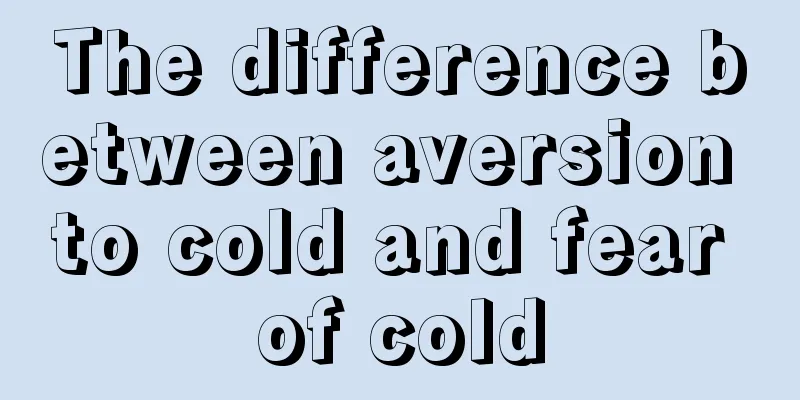The difference between aversion to cold and fear of cold

|
Aversion to cold and fear of cold are both professional terms in traditional Chinese medicine. Since both contain the word "cold" and their clinical manifestations have some similarities, many people are confused about the specific difference between the two. We say that if the patient always feels afraid of cold and still feels cold all over after adding more clothes and quilts, this situation should be regarded as a symptom of chills. Clinically, symptoms such as fever, headache, and floating pulse often appear simultaneously with aversion to cold. 1. Definition and difference between fear of cold and aversion to cold Definition of chills : Feeling cold and being able to relieve the chill by adding more clothes or getting closer to a fire to keep warm. Definition of chills : Feeling afraid of cold, even though adding more clothes, covering with blankets and taking warming measures, the feeling of coldness cannot be relieved. 2. Differentiation and determination of fear of cold and aversion to cold Aversion to cold and fear of chills both mean being afraid of cold, but they are two different concepts with different mechanisms and manifestations. Chills and fever are external symptoms, and the evil and righteousness are fighting against each other. More cold and less heat is due to wind-cold, and less cold and more heat is due to wind-heat. When you feel cold, adding more clothes and quilts or getting closer to the fire can relieve the symptoms, and the symptoms will be relieved when you are warm. This is an internal injury. It is caused by deficiency of Yang and lack of warmth. 3. Causes of chills 1. According to traditional Chinese medicine , there are two main reasons for fear of cold. First, the invasion of evil cold or eating cold food leads to the accumulation of yin and cold inside the body, which blocks the yang energy, causes the body to lose warmth and causes fear of cold. Second, the yang energy of the internal organs is weak and unable to warm the body, causing fear of cold. This is a deficiency-cold syndrome. For example, heart yang deficiency, spleen yang deficiency, kidney yang deficiency, etc., all have fear of cold as one of the main manifestations. 2. From the perspective of Western medicine , people who are iron deficient have less hemoglobin, which affects the blood's oxygen-carrying capacity and causes disorders in tissue energy metabolism. People will feel abnormally cold due to insufficient heat generated. People with low blood pressure have insufficient peripheral blood circulation, and their body tissues do not get enough oxygen and energy, which can cause them to feel cold. 4. Causes of aversion to cold Aversion to cold is the main symptom of exogenous syndrome. At the beginning of an exogenous disease, external evil invades, and the struggle between the righteous and the evil is suppressed, which blocks the Yang, preventing the Wei Yang Qi from reaching the outside, causing the skin to lose warmth and causing aversion to cold. At this time, even if you add more clothes and get close to the fire, the external evil cannot be eliminated, and the evil Qi is suppressed and cannot be released, so the body's Yang Qi cannot be released to the surface, and therefore the feeling of warmth and fear of cold is not significantly relieved. |
>>: What does chills and cold limbs mean
Recommend
Will flat warts disappear on their own? How to treat them
Generally speaking, when flat warts appear, there...
Grape seed extract
Speaking of grape seed extract, I believe everyon...
Famous hospital for treating colorectal cancer
How do famous hospitals in the country treat colo...
What's the matter with peeling feet
Many people have experienced peeling of the soles...
Can omeprazole treat gastritis?
In current clinical practice, omeprazole is mainl...
Family inheritance of esophageal cancer
There is a familial clustering phenomenon in the ...
Tips to remove the odor of urine pot
If you use a urinal for urination for a long time...
Distinguish between pancreatic cancer and stomach disease
Pancreatic cancer and gastric disease have many s...
Acupuncture points for sleeping
I have seen many people who are troubled by sleep...
What to do if there are blue spots under the eyes
The reasons that cause some problems in our body ...
Does solid wood furniture contain formaldehyde?
After the new house is renovated, in order to mak...
Throat inflammation and blood in sputum_What is the reason for blood in sputum?
When you cough and there is blood in your sputum,...
Traditional Chinese medicine treats skin cancer caused by evil toxins
Traditional Chinese medicine believes that skin c...
What to do if lips peel after applying lipstick
Lipstick is an indispensable cosmetic for women t...
There are so many differences between herpes and shingles
Herpes and shingles are both medical terms that p...









